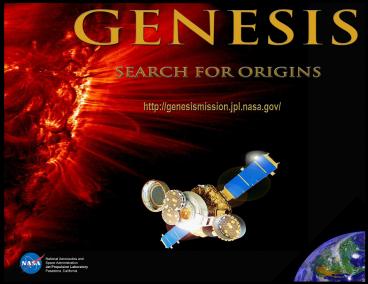Genesis - Launch - PowerPoint PPT Presentation
Title: Genesis - Launch
1
(No Transcript)
2
Genesis - Launch
3
GenesisSearch for Origins
- NASA Sample Return Mission
- NASAs first sample return mission since Apollo
- First Sample Return from beyond the Moon
- 5th Discovery Class mission
- Mars Pathfinder
- Near Earth Asteriod Rendezvous
- Lunar Prospector
- Stardust
- Genesis
- Characterized by Focused Science Objectives, Low
Cost, Short Development Time - Conceived in early eighties Selected in 1997
after a competition with 35 other mission
proposals - A partnership of Academic, Industrial and NASA
space - Principal Investigator Dr. Don Burnett /
Caltech - Project Management Jet Propulsion Laboratory
(JPL)
4
Science Objectives
- To Collect Samples of the Solar Wind and Return
them to Earth - To accurately determine the Composition of the
Sun and then Address the Processes Involved in
the Origins of the Solar System.
i.e., Whats the Data Used For?
5
Examples of Major Science Questions for Which
Genesis Will Provide Information
- 1) What Is the Sun Made Of?
- 2) Are we made of the same stuff?
- 3) How Can We Explain the Great Diversity of
Planetary - Objects?
- 4) What Makes Earth Different From Its Planetary
- Neighbors?
But Dont We Already Know the Composition of the
Solar Wind?
Sci-1R
6
Essentially Little Is Known About SOLAR ISOTOPIC
Composition
- 1) Apollo Foils Provided Precise Solar Wind He
and Ne Isotope Ratio With 20Ne/22Ne Ratio a
Surprising 38 Greater Than The Terrestial
Atmosphere - 2) The Only Practical Source Of Solar Isotopic
Abundances is the Solar Wind - 3) No Solar-Terrestial Differences Can Be Seen
for C, O, Mg Isotopes, - but Uncertainty in the data is 5 - 40
- Best Source of Data
- There Is No Data For A Significant Number Of
Elements Since They Cannot Be - Measured At All
- A Small Number of Elements Have Quoted Errors of
10 But Overall, There Are - Large Uncertainties
- Meteorite Analysis Depend On Knowledge Of Its
Background Noise
7
Genesis Ion Recipe
8
Science Collection/Measurement
- Measure Elemental Isotopic Abundances of Solar
Wind Ions. - Collect Separate Samples for Each of 3 Solar-Wind
Regimes Low Speed, Coronal Hole, and Coronal
Mass Ejections - Provide a Reservoir of Solar Matter for Future
Analysis
9
Collecting Solar Wind
Science Devices GEM GIM Monitors Select Regime
Grid Voltage Collectors Arrays 2 Bulk
Collectors IS Bottom (L) 3 CH Middle (H)
2 CME Top (E) 1 Concentrator Mass 6-22
Primary - Oxygen Secondary Collector Radioactive
Nuclei
Radiative Zone
Convective Zone
Wind Regimes_ IS Interstream 60
(Slow Wind) CH Coronal 25
Holes (Fast Wind) CME Coronal 15
Mass Ejection
(Low or High Speed)
Solar Wind Quasi-Stationary 300 - 800
km/sec Transient Up to 1000 km/sec
Photoshpere (visible)
Corona (uv x-ray)
Core (fusion)
Coronal Hole (lowered coronal density)
Flares/Coronal Transients
Chromosphere (uv x-ray)
10
Genesis Flying Ions
11
Collector Array Design
Schematic View of Top 100 nm
Array 55 Standard 6 Partial
Wafer
- Requirements on Collectors
- Bulk Solar-Wind Collector Area, gt 0.6 m2
- Each of 3 Special-Regime Collector Areas, gt 0.3
m2 - Material From Each Array Shall Be Uniquely
Identifiable In Case Material is Dislodged. - Radioactive Nuclei Collectors Exposed in Lid of
SRC.
12
Collecting Solar Wind Ions
13
Completed Flight H-Array in Clean Room
14
Spacecraft Configurations
15
Spacecraft on Launch Vehicle
16
Spacecraft in Launch Vehicle Faring
17
Spacecraft on Launch Pad at KSC
18
Spacecraft in Clean Room
19
The GENESIS Payload
20
Genesis
21
Mission Trajectory
Genesis is here 6/25/04
22
Mission Events
- Launch 8/8/2001
- Start of Sample Collection 10/21/2001
- Halo Orbit Insertion 11/16/2001
- Completion of Sample Collection 4/2/2004
- Sample material collected
- 1020 Ions
- 0.5 milligrams
- Earth Flyby on way to L2 5/2/2004
- Sample Capsule Return to Earth 9/8/2004
23
SRC Separation
SRC release at E 4 hrs R 60K km
24
Entry
25
Genesis Atmospheric Entry
26
Genesis Safe Arrival ZoneUtah Test Training
Range
27
Genesis Drogue Parafoil view from SRC
28
Genesis Mid-Air Capture - View from Helo
29
GenesisSearch for Origins































